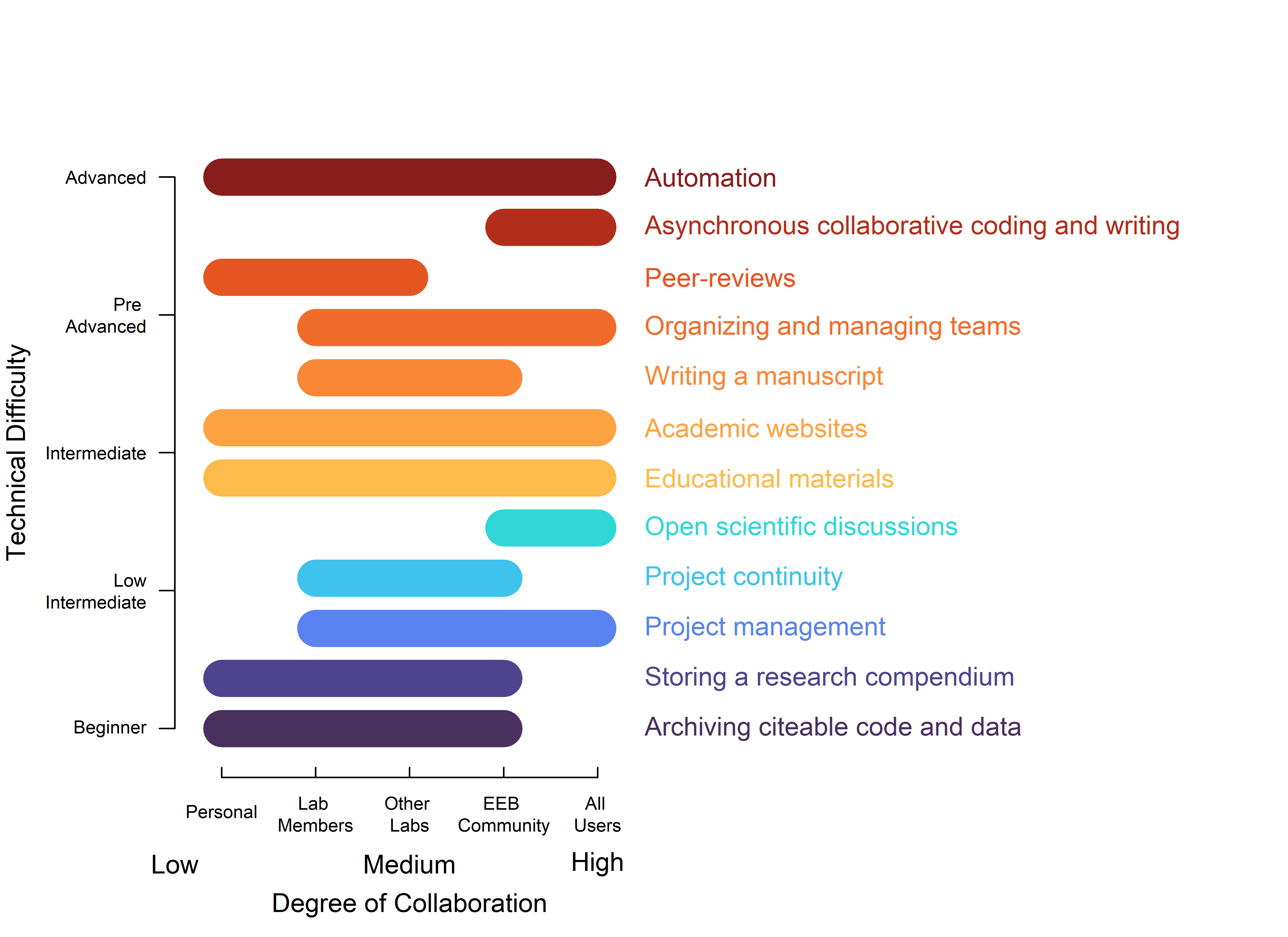Main content
Home
Menu
Not just for programmers: How GitHub can accelerate collaborative and reproducible research in ecology and evolution
Our study has been peer-reviewed and published in Methods in Ecology and Evolution.
This paper is the result of an academic hackathon held during the 2021 conference for the Society for Open, Reliable, and Transparent Ecology and Evolutionary Biology (SORTEE).
We convened around thirty researchers in ecology and evolutionary biology with varying levels of familiarity with the use of GitHub in research projects. The aim of the hackathon was to showcase and discuss how existing features of GitHub can contribute to documentation and collaboration in ecology and evolutionary biology research. During the event, we identified the need for formal discussions on how ecology and evolutionary biology researchers can benefit from GitHub and its features.
We outline twelve practical ways that ecology and evolutionary biology researchers can use GitHub features for more collaborative, transparent, and reproducible science. We also provide critical perspectives on features that could be improved and catered towards research development, drawing on examples from the literature.

This figure provides a summary of ways GitHub can be used showing technical difficulty and degree of collaboration for each. Activities higher on the vertical axis require usage knowledge of more GitHub features than activities lower on the axis. On the horizontal axis, each activity spans a region representing who is potentially involved with or benefits from each activity. For example, storing data and code mainly benefits individual researchers or members of a laboratory while making data and code citable and reproducible benefit other labs and the larger community as well. Independently of one's knowledge of GitHub features, there are ways to use GitHub that allow tapping unto one of the strongest benefits of the platform: facilitating and enhancing collaboration.
How to cite the peer-reviewed publication?
Direct entry:
Braga, P. H. P., Hébert, K., Hudgins, E. J., Scott, E. R., Edwards, B. P. M., Sánchez Reyes, L. L., Grainger, M. J., Foroughirad, V., Hillemann, F., Binley, A. D., Brookson, C. B., Gaynor, K. M., Shafiei Sabet, S., Güncan, A., Weierbach, H., Gomes, D. G. E., & Crystal-Ornelas, R. (2023). Not just for programmers: How GitHub can accelerate collaborative and reproducible research in ecology and evolution. Methods in Ecology and Evolution, 00, 1– 17. https://doi.org/10.1111/2041-210X.14108.
BibTeX entry:
@article{bragaNotJustProgrammers2023,
title = {Not Just for Programmers: {{How GitHub}} Can Accelerate Collaborative and Reproducible Research in Ecology and Evolution},
author = {Braga, Pedro Henrique Pereira and H{\'e}bert, Katherine and Hudgins, Emma J. and Scott, Eric R. and Edwards, Brandon P. M. and S{\'a}nchez Reyes, Luna L. and Grainger, Matthew J. and Foroughirad, Vivienne and Hillemann, Friederike and Binley, Allison D. and Brookson, Cole B. and Gaynor, Kaitlyn M. and Shafiei Sabet, Saeed and G{\"u}ncan, Ali and Weierbach, Helen and Gomes, Dylan G. E. and {Crystal-Ornelas}, Robert},
year = {2023},
journal = {Methods in Ecology and Evolution},
volume = {n/a},
number = {n/a},
pages = {1-17},
doi = {10.1111/2041-210X.14108},
copyright = {All rights reserved},
langid = {english},
keywords = {collaboration,data management,ecoinformatics,GitHub,open science,project management,reproducible research,version control},
}
Page permissions have changed
Your browser should refresh shortly…
Renaming wiki...
Wiki page deleted
Press Confirm to return to the project wiki home page.
Connected to the collaborative wiki
This page is currently connected to the collaborative wiki. All edits made will be visible to contributors with write permission in real time. Changes will be stored but not published until you click the "Save" button.
Connecting to the collaborative wiki
This page is currently attempting to connect to the collaborative wiki. You may continue to make edits. Changes will not be saved until you press the "Save" button.
Collaborative wiki is unavailable
The collaborative wiki is currently unavailable. You may continue to make edits. Changes will not be saved until you press the "Save" button.
Browser unsupported
Your browser does not support collaborative editing. You may continue to make edits. Changes will not be saved until you press the "Save" button.

Start managing your projects on the OSF today.
Free and easy to use, the Open Science Framework supports the entire research lifecycle: planning, execution, reporting, archiving, and discovery.
Copyright © 2011-2025
Center for Open Science
|
Terms of Use
|
Privacy Policy
|
Status
|
API
TOP Guidelines
|
Reproducibility Project: Psychology
|
Reproducibility Project: Cancer Biology